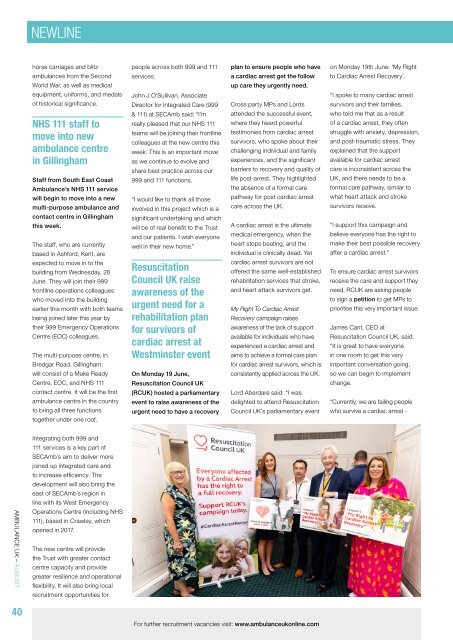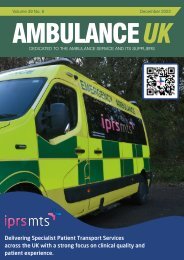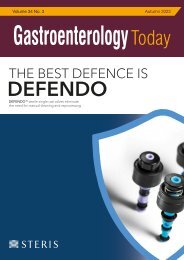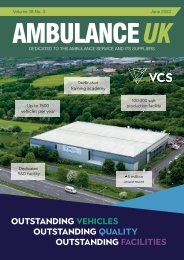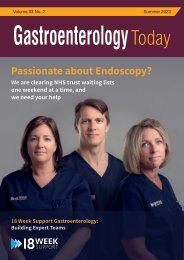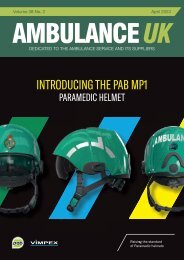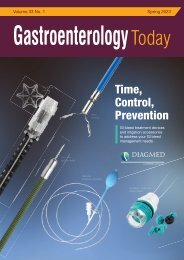Create successful ePaper yourself
Turn your PDF publications into a flip-book with our unique Google optimized e-Paper software.
NEWLINE<br />
horse carriages and blitz<br />
ambulances from the Second<br />
World War, as well as medical<br />
equipment, uniforms, and medals<br />
of historical significance.<br />
NHS 111 staff to<br />
move into new<br />
ambulance centre<br />
in Gillingham<br />
Staff from South East Coast<br />
<strong>Ambulance</strong>’s NHS 111 service<br />
will begin to move into a new<br />
multi-purpose ambulance and<br />
contact centre in Gillingham<br />
this week.<br />
The staff, who are currently<br />
based in Ashford, Kent, are<br />
expected to move in to the<br />
building from Wednesday, 28<br />
June. They will join their 999<br />
frontline operations colleagues<br />
who moved into the building<br />
earlier this month with both teams<br />
being joined later this year by<br />
their 999 Emergency Operations<br />
Centre (EOC) colleagues.<br />
The multi-purpose centre, in<br />
Bredgar Road, Gillingham,<br />
will consist of a Make Ready<br />
Centre, EOC, and NHS 111<br />
contact centre. It will be the first<br />
ambulance centre in the country<br />
to bring all three functions<br />
together under one roof.<br />
people across both 999 and 111<br />
services.<br />
John J O’Sullivan, Associate<br />
Director for Integrated Care (999<br />
& 111) at SECAmb said: “I’m<br />
really pleased that our NHS 111<br />
teams will be joining their frontline<br />
colleagues at the new centre this<br />
week. This is an important move<br />
as we continue to evolve and<br />
share best practice across our<br />
999 and 111 functions.<br />
“I would like to thank all those<br />
involved in this project which is a<br />
significant undertaking and which<br />
will be of real benefit to the Trust<br />
and our patients. I wish everyone<br />
well in their new home.”<br />
Resuscitation<br />
Council <strong>UK</strong> raise<br />
awareness of the<br />
urgent need for a<br />
rehabilitation plan<br />
for survivors of<br />
cardiac arrest at<br />
Westminster event<br />
On Monday 19 June,<br />
Resuscitation Council <strong>UK</strong><br />
(RC<strong>UK</strong>) hosted a parliamentary<br />
event to raise awareness of the<br />
urgent need to have a recovery<br />
plan to ensure people who have<br />
a cardiac arrest get the follow<br />
up care they urgently need.<br />
Cross party MPs and Lords<br />
attended the successful event,<br />
where they heard powerful<br />
testimonies from cardiac arrest<br />
survivors, who spoke about their<br />
challenging individual and family<br />
experiences, and the significant<br />
barriers to recovery and quality of<br />
life post-arrest. They highlighted<br />
the absence of a formal care<br />
pathway for post cardiac arrest<br />
care across the <strong>UK</strong>.<br />
A cardiac arrest is the ultimate<br />
medical emergency, when the<br />
heart stops beating, and the<br />
individual is clinically dead. Yet<br />
cardiac arrest survivors are not<br />
offered the same well-established<br />
rehabilitation services that stroke,<br />
and heart attack survivors get.<br />
My Right To Cardiac Arrest<br />
Recovery campaign raises<br />
awareness of the lack of support<br />
available for individuals who have<br />
experienced a cardiac arrest and<br />
aims to achieve a formal care plan<br />
for cardiac arrest survivors, which is<br />
consistently applied across the <strong>UK</strong>.<br />
Lord Aberdare said: “I was<br />
delighted to attend Resuscitation<br />
Council <strong>UK</strong>’s parliamentary event<br />
on Monday 19th June: ‘My Right<br />
to Cardiac Arrest Recovery’.<br />
“I spoke to many cardiac arrest<br />
survivors and their families,<br />
who told me that as a result<br />
of a cardiac arrest, they often<br />
struggle with anxiety, depression,<br />
and post-traumatic stress. They<br />
explained that the support<br />
available for cardiac arrest<br />
care is inconsistent across the<br />
<strong>UK</strong>, and there needs to be a<br />
formal care pathway, similar to<br />
what heart attack and stroke<br />
survivors receive.<br />
“I support this campaign and<br />
believe everyone has the right to<br />
make their best possible recovery<br />
after a cardiac arrest.”<br />
To ensure cardiac arrest survivors<br />
receive the care and support they<br />
need, RC<strong>UK</strong> are asking people<br />
to sign a petition to get MPs to<br />
prioritise this very important issue.<br />
James Cant, CEO at<br />
Resuscitation Council <strong>UK</strong>, said:<br />
“It is great to have everyone<br />
in one room to get this very<br />
important conversation going,<br />
so we can begin to implement<br />
change.<br />
“Currently, we are failing people<br />
who survive a cardiac arrest -<br />
AMBULANCE <strong>UK</strong> – AUGUST<br />
Integrating both 999 and<br />
111 services is a key part of<br />
SECAmb’s aim to deliver more<br />
joined up integrated care and<br />
to increase efficiency. The<br />
development will also bring the<br />
east of SECAmb’s region in<br />
line with its West Emergency<br />
Operations Centre (including NHS<br />
111), based in Crawley, which<br />
opened in 2017.<br />
The new centre will provide<br />
the Trust with greater contact<br />
centre capacity and provide<br />
greater resilience and operational<br />
flexibility. It will also bring local<br />
recruitment opportunities for<br />
40<br />
For further recruitment vacancies visit: www.ambulanceukonline.com


